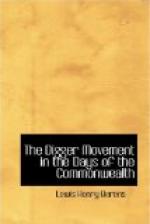FOOTNOTES:
[90:1] British Museum, Press Mark, 1027, i. 16 (3). We say “mainly from Winstanley’s pen,” for though the arguments are his, the style of the pamphlet, with its long, involved, never-ending sentences, so unlike Winstanley’s crisp, epigrammatic, vigorous style, suggests to us that the writing was probably left to some other member of his company, or probably to a Committee appointed for the purpose.
[93:1] This fairly represents the general spirit and feeling prevailing in the Model Army, who repeatedly contended, to quote the words of the Declaration of the Army of June 14th, 1647, that—“We are not a mere mercenary army hired to serve any arbitrary power of a State, but called forth and conjured by the several Declarations of Parliament to the defence of our own and the people’s just Rights and Liberties; and so we took up arms in judgment and conscience to those ends, and have so continued in them, and are resolved according to your first just desires in your Declarations, and such principles as we have received from your frequent informations, and our own common sense concerning those our fundamental rights and liberties, to assert and vindicate the just power and rights of this Kingdom in Parliament for those common ends promised against all arbitrary power, violence and oppression, and against all particular parties or interests whatsoever.”
[95:1] King’s Pamphlets. British Museum, Press Mark, E. 552. In the British Museum Catalogue the Preface is attributed to John Taylor the Water Poet; but, to judge from his other writings, this is probably an error.
CHAPTER X
A LETTER TO LORD FAIRFAX AND HIS COUNCIL OF WAR; AND AN APPEAL TO THE HOUSE OF COMMONS
“For you must either establish Commonwealth’s Freedom in power, making provision for everyone’s peace, which is Righteousness, or else you must set up Monarchy again. Monarchy is twofold, either for one king to reign, or for many to rule by kingly principles. For the king’s power lies in his laws, not in his name. And if either one king rule, or many rule by kingly principles, much murmuring, grudges, troubles, and quarrels may and will arise among the oppressed people upon every gained opportunity.”—WINSTANLEY, The Law of Freedom.
Within a few days of Lord Fairfax’s visit to the Diggers, already recorded, and about two months after the publication of The True Levellers Standard Advanced, Winstanley, on June 9th, 1649, again made his appearance at the headquarters of the Army, the bearer of a letter, which, as he tells us, he himself delivered to the Lord General, “who very mildly promised to read it and consider of it”:




